| Srl | Item |
| 1 |
ID:
067405
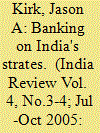

|
|
|
| 2 |
ID:
098072
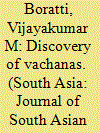

|
|
|
| 3 |
ID:
149489
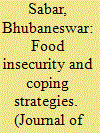

|
|
|
|
|
| Summary/Abstract |
This paper explores the food insecurity level and coping strategies of two particularly vulnerable tribal groups (PVTGs) in India. It finds that despite the availability of resources, limited income always becomes a proxy for their food vulnerability because they cannot purchase food items outside state programmes. These groups traditionally adopt various coping strategies to overcome food insecurity at household level and these have become a structure and behaviour for ensuring food security
|
|
|
|
|
|
|
|
|
|
|
|
|
|
|
|
| 4 |
ID:
187123
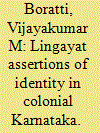

|
|
|
|
|
| Summary/Abstract |
In the wider context of how census enumeration has been studied with varied academic interests in South Asian history, this article focuses on how the Lingayats of Karnataka, since the colonial period, received, negotiated and manipulated their hurtful description in the 1881 Census as a low-caste Hindu community, defending themselves against British and Brahmins’ misuse of taxonomic navigation.
|
|
|
|
|
|
|
|
|
|
|
|
|
|
|
|
| 5 |
ID:
112108
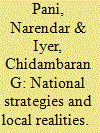

|
|
|
|
|
| Publication |
2012.
|
| Summary/Abstract |
Despite sporadic attention paid to the case for "shock therapy," the conceptualization of the implementation stage of policy making does not always get the attention it deserves. As a result there is inadequate understanding of the precise role this conceptualization plays in the transformation of a policy initiative into practice. This article draws on some of the insights of Amartya Sen, in another context, to identify different approaches to the conceptualization of the implementation of policy initiatives. It goes on to explore the consequences of using what we have termed the Greenfield approach in a reality marked by diversity in social, economic and political relations. It does so using the experience of the working of the Mahatma Gandhi National Rural Employment Guarantee Scheme in the south Indian state of Karnataka.
|
|
|
|
|
|
|
|
|
|
|
|
|
|
|
|
| 6 |
ID:
178071
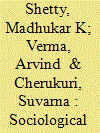

|
|
|
|
|
| Summary/Abstract |
Modern states have to reckon with the problem of corruption because of its derailing influence on the functioning of government. This paper argues that state–society relations frame the context in which the incidence of corruption and the state’s response to corruption become mutually reinforcing processes. We define this as “structures of irresolution” wherein an idealized abstract image of the state is constructed and corruption is blamed upon individual aberrations rather than the deviant nature of the state itself. We apply this framework to examine the functions of Karnataka Lokayukta, an anticorruption institution in India. Our data comes from the Annual Reports of this Lokayukta between 1987 and 2015 and corruption cases from Crime in India statistics. Our analysis shows that Lokayukta targeted officials disproportionately from lower sections of the bureaucracy. We recommend decentralized accountability mechanisms that redefine the relations between the individual, institutions, and the state to combat corruption effectively.
|
|
|
|
|
|
|
|
|
|
|
|
|
|
|
|
| 7 |
ID:
118051


|
|
|
| 8 |
ID:
148271
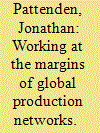

|
|
|
|
|
| Summary/Abstract |
This article analyses why informal labourers working ‘at the margins’ of global production networks lack ‘structural’ and ‘associational’ power. It does so in order to better understand potential changes in their material and political conditions, and as part of broader calls to put labour at the centre of development studies. The article focuses on rural-based labourers in south India who work relatively invisibly as agricultural labourers and informal factory workers, and on the construction sites of a ‘global city’ (Bangalore). It deploys a three-way labour control regime framework that encompasses (1) the macro-labour control regime, which is ultimately defined by capitalist relations of production, and characterised in India by particularly high levels of informality (precarious and largely unregulated work) and segmentation (due to the fragmentary impact of caste); (2) the local labour control regime, which refers to how class relations in specific places are shaped by patterns of accumulation and work (themselves shaped by differences in agro-ecology, irrigation, and remoteness from non-agricultural labour markets), distributions of classes and castes, and the uneven presence of the state; and (3) the labour process, which is increasingly marked by forms of ‘remote control’ marshalled by labour intermediaries. Debate on the macro-labour control regime and on the labour process is well established, but little has been said about local labour control regimes, which are newly defined here and discussed in terms of differences between ‘wetland/circulation zones’ and ‘dryland/commuting zones’. The article identifies locations where labour has greater potential structural and associational power. Increased worker organisation in these areas could have knock-on effects in more ‘obscure’ sites.
|
|
|
|
|
|
|
|
|
|
|
|
|
|
|
|